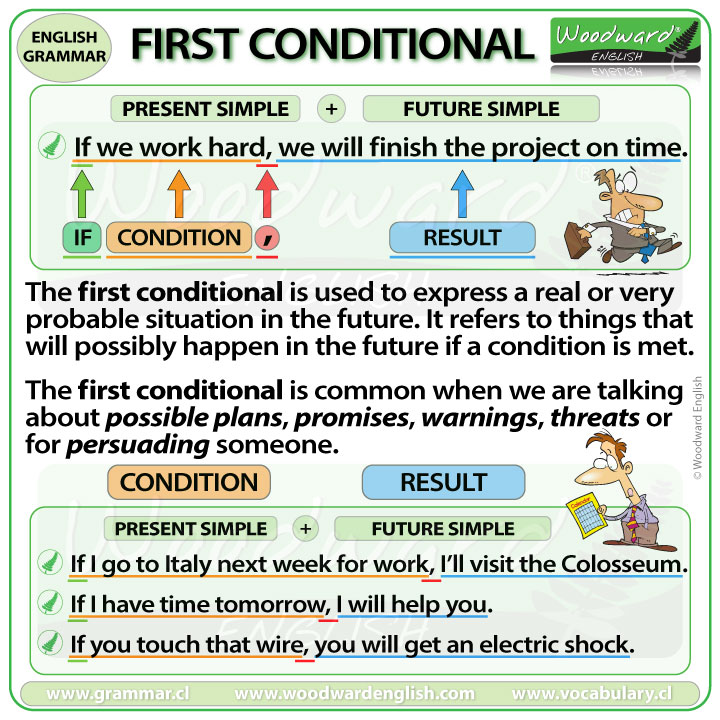If we work hard, we will finish the project on time.
This is an example of a first conditional sentence.
The first part is in the present simple tense and the second part is in the future simple tense.
What does this mean?
First Conditionals – If clauses
Also known as Type 1 conditionals (real present)
The first conditional is used to express a real or very probable situation in the present or future.
It is for things that will possibly happen in the future if a condition is met. In a way, we are predicting a likely result in the future if a certain condition happens.
The first conditional uses the present simple in the if-clause and the future simple in the main clause.
If + Present Simple, Future Simple
(If + condition, result)
Let’s look at this sentence again:
- If we work hard, we will finish the project on time.
The condition is: if we work hard.
This is an if-clause because it begins with IF.
What is the result of this if-clause?
The result is: we will finish the project on time.
Also, we have to use a comma at the end of an if-clause, when an if-clause comes at the beginning of the sentence.
Here I am saying it is possible that we will finish the project on time on the condition of working hard now. I am predicting that this is the likely result in the future. The main clause is in the future simple tense… we WILL finish.
It is also important to note that the if-clause must be in the present simple tense.
We say: If we work hard, we will finish the project on time.
We cannot say: If we will work hard… (this is NOT correct)
Here are some more example sentences of the first conditional.
- If you like Suzy Singer, then you’ll love her new album. (Remember: you’ll is a contraction of you will.)
- If you take this medicine, you will feel much better.
- A: Where are my keys?
B: If you look in the garage, you will find them. - Don’t worry. If I see John, I won’t tell him about the surprise.
(You can see that we can use a negative form of the future simple… won’t is a contraction of will not) - If I don’t feel well tomorrow, I won’t go to work.
- If the weather is nice tomorrow, we will have a picnic at the park.
- If he doesn’t arrive soon, we will leave without him.
Notice how there is a comma after the if-clause.
Look at this sentence:
- If it rains tomorrow, we will stay home.
Remember, we cannot say “If it will rain tomorrow”. The if-clause needs to be in the present simple tense.
Result + if + condition
We can also change the order of the sentence and have the main clause (the result) before the if-clause (the condition).
How can we change our example sentence (If it rains tomorrow, we will stay home) to this order? We say:
- We will stay home if it rains tomorrow.
Note that with this order, we do NOT use a comma between the clauses.
Let’s change the order of the example sentences we have already seen.
- You will find them if you look in the garage.
- You will feel much better if you take this medicine.
- I won’t tell John about the surprise if I see him.
- We will leave without him if he doesn’t arrive soon.
Possible plans, promises, warnings, threats, persuasion
The first conditional is common when we are talking about possible plans, promises, warnings, threats or for persuading someone. We are predicting a likely result in the future if a condition is fulfilled.
- If I go to Egypt next month for work, I’ll visit the pyramids. (plans)
- If I have time, I will do help you. (promise)
- If you touch that wire, you will get an electric shock. (warning)
- If you eat my chocolate, you’ll sleep outside with the dog. (threat)
- If you drive us to the concert, I’ll pay for the parking. (persuasion)
English Summary Chart

